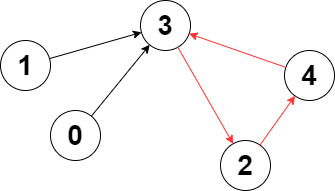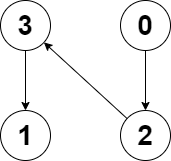2360. Longest Cycle in a Graph


Description
You are given a directed graph of n nodes numbered from 0 to n - 1, where each node has at most one outgoing edge.
The graph is represented with a given 0-indexed array edges of size n, indicating that there is a directed edge from node i to node edges[i]. If there is no outgoing edge from node i, then edges[i] == -1.
Return the length of the longest cycle in the graph. If no cycle exists, return -1.
A cycle is a path that starts and ends at the same node.
Example 1:

Input: edges = [3,3,4,2,3] Output: 3 Explanation: The longest cycle in the graph is the cycle: 2 -> 4 -> 3 -> 2. The length of this cycle is 3, so 3 is returned.
Example 2:

Input: edges = [2,-1,3,1] Output: -1 Explanation: There are no cycles in this graph.
Constraints:
n == edges.length2 <= n <= 105-1 <= edges[i] < nedges[i] != i
Solution
longest-cycle-in-a-graph.py
class Solution:
def longestCycle(self, edges: List[int]) -> int:
n = len(edges)
visited = [False] * n
res = -1
for node in range(n):
dist = {}
d = 0
while node != -1 and not visited[node]:
visited[node] = True
dist[node] = d
node = edges[node]
d += 1
if node != -1 and node in dist:
res = max(res, d - dist[node])
return res